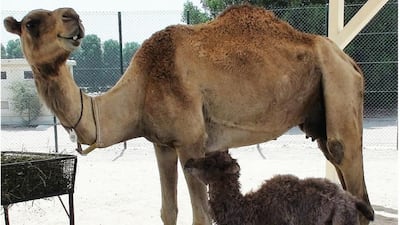DUBAI // Scientists have cloned the endangered two-humped camel for the first time – by using the familiar one-humped camel as the surrogate mother and egg donor.
The male two-humped or Bactrian calf – nicknamed Cosy by the researchers who helped to create him at the Reproductive Biology Centre in Dubai – was struck down by an infection that killed him and a number of other camels.
Despite the sad outcome, the creature’s birth offers hope that the same method could be used to help preserve the Bactrian camel, which is classified by the International Union for Conservation of Nature as “critically endangered”.
“It’s fantastic, it’s really a great achievement. I was really happy. All the team worked very hard for this success,” said Dr Nisar Wani, the centre’s scientific director.
In a complex technique, the scientists at the Nad Al Sheba centre transferred genetic material from the Bactrian camel into eggs taken from a one-humped camel or dromedary, the type familiar in the Gulf region.
The eggs were implanted into female dromedaries and, last year, after a gestation period of about 13 months, a live male calf was born.
“It was very cosy, so we called him Cosy. A very lovely calf,” Dr Wani said.
About a week later, however, the calf became feverish, collapsed in the night and died from septicaemia. Describing his death as a “really terrible” event that upset staff, Dr Wani said the calf fell ill “very suddenly”. A number of other animals at the centre, including adult camels, also died.
Outlined in a paper published this week in the scientific journal PLOS One, the project represents the first time that a Bactrian camel has been cloned.
It is also the first time that the interspecies somatic cell nuclear transfer or iSCNT technique (so named because somatic, or non-reproductive, cells were transferred into recipient eggs) has been successfully employed with the Bactrian.
Eggs containing Bactrian genetic material were implanted into 23 dromedary surrogate mothers, five of which became pregnant, with one pregnancy going to full term.
The method offers a way of producing Bactrian camels without using up the limited egg supply from that species.
“The significance is that it’s a step forward in preserving the critically endangered Bactrian camels. We have only 700 to 800 left in Mongolia and China, in the Gobi Desert,” Dr Wani said.
“We have the technique now. There are some groups looking after the breeding of wild [Bactrian] camels. We can take the cells from some of the camels and produce babies that can be released back into the wild.”
The iSCNT technique has been used to clone other animals, including the African wildcat, cloned individuals of which were born to domestic cat surrogate mothers in 2003. But it is not an easy technique to use.
“When you put the genetic material from one species in another animal’s eggs, most of the time it happens that it rejects it. That’s why interspecies somatic cell nuclear transfer has not been that successful so far. Only when they’re related species has it been successful,” Dr Wani said.
“The Bactrians have longer gestation [than dromedaries]; otherwise the physiology is similar. If we’d put these cloned embryos into cattle, they would definitely not survive.”
Having shown that the method works, the centre is keen to produce more calves, although this will depend upon additional funding. It would like to have a bank of cell lines from wild and captive Bactrian camels that could be used for further cloning.
The centre was the first in the world to clone dromedaries, the first of which, Injaz, was born in 2009. Six years later she herself fell pregnant naturally. Typically, about a dozen cloned dromedaries are now born at the centre each year, with the method being used to produce top racing camels.
Dr Wani co-authored the latest paper with two other scientists at the centre, Dr Binoy Vettical and Seung Hong. The director general of the centre is Dr Ali Ridha Al Hashimi and it was set up under the patronage of Sheikh Hamdan bin Mohammed, Crown Prince of Dubai.
newsdesk@thenational.ae


